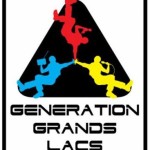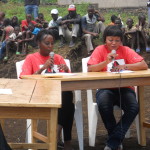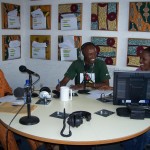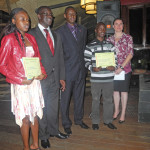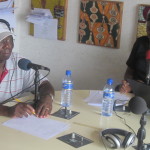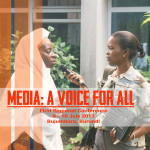100 episodes: Radio bridges youth of DRC, Burundi & Rwanda
By : Whitney Skippings
“Generation Great Lakes opened my eyes, gave me a more positive vision on the role of the media involving Rwandan, Burundian, and Congolese youth in the reconstruction of their respective societies and across borders. Long live GGL!”
-Facebook commenter
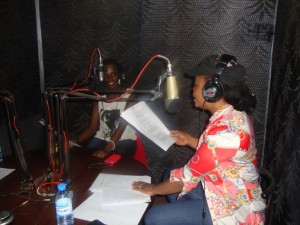 August 10th marked the 100th episode of Génération Grands Lacs (GGL), which producers used as an opportunity to recap the radio show’s greatest successes and flops. A multilingual broadcast in Rwanda, Burundi, and the Democratic Republic of the Congo, GGL manages to reach tens of thousands— if not millions— of listeners in the region.
August 10th marked the 100th episode of Génération Grands Lacs (GGL), which producers used as an opportunity to recap the radio show’s greatest successes and flops. A multilingual broadcast in Rwanda, Burundi, and the Democratic Republic of the Congo, GGL manages to reach tens of thousands— if not millions— of listeners in the region.
This project specifically targets the quickly growing youth demographic in the region, fostering camaraderie and understanding across borders through discussion and debate. According to the National Youth Policy of Rwanda, over 65% of the Rwandan population is under 25 years old, implying that long-term peace in the region largely depend on mutual understanding of this age group. Rwanda’s youth boom is part of a larger trend in East Africa, where over 80% of the regional population is categorized as a “child or youth.” GGL launched in 2006 with this in mind. It provides an outlet for these future regional leaders, allowing their active participation in the show.
While text, phone calls, and email are a large part of audience contributions, social media is also integrated into GGL’s programming. An extraordinarily active Facebook page accompanies the radio show, where discussion topics build anticipation for the upcoming broadcast. Each week the production team posts the theme for the upcoming program, and listeners from across the region and the diaspora post their thoughts.
Over the last few years, broadcasts have tackled subjects such as arbitrary arrests, prostitution, drug trafficking, and other cross-cutting issues in the region, but the 100th episode took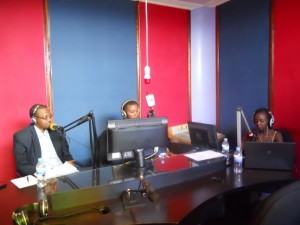 an introspective route. Instead of the usual provocative debates, this broadcast sought the listeners’ views about what part of the GGL programming meant the most to them.
an introspective route. Instead of the usual provocative debates, this broadcast sought the listeners’ views about what part of the GGL programming meant the most to them.
On the Facebook group, listeners responded to the 100th broadcast status with many messages of thanks and encouragement, reinforcing the impact that GGL has on its target audience. One follower responded:
“Once again I say thank you for helping us better understand society outside our own in the DRC, Burundi, and Rwanda….”
Another commenter took the time to praise GGL:
“Time passes quickly; when I listened to GGL on Contact FM Kigali, I never thought that someday GGL would reach its 100th edition. I truly lack the words for the brave initiators of this program.”
Overall, the sentiment is overwhelmingly positive, crediting GGL with helping its listeners better comprehend the livelihoods of those beyond their borders. It is already clear that in the first 100 episodes, GGL has managed to shift the mentalities of its audience.
As a Masters student of International Security, initiatives such as GGL provide me with an opportunity to observe how the media can facilitate sustainable peace. GGL illustrates the effect that sensitive programming can have on an otherwise tense population. While it has not completely eliminated what are sometimes longstanding hatreds between parities, it makes significant strides in cultivating regional understanding. `
The Facebook page provides weekly directions for how to listen to GGL radio show. For those interested in listening to the program over the Internet, it is broadcast by these SFCG partners: www.isangostar.org, www.isanganiro.org, www.groupelavenir.cd, and www.mishapivoicetv.net
_________________________________________
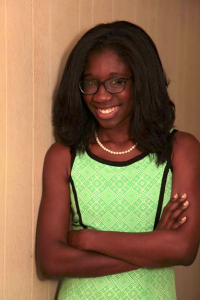 Born and raised in Silver Spring, Maryland, Whitney Skippings is a Regional Intern for SFCG, based in Kigali, Rwanda. She holds Bachelors degrees in Philosophy and International Studies from Spelman College. Currently, she is trudging her way through Georgetown University’s Security Studies Program with a concentration in terrorism and substate violence. This is her second foray in the region, after studying abroad in Kigali, and Gulu, Northern Uganda.
Born and raised in Silver Spring, Maryland, Whitney Skippings is a Regional Intern for SFCG, based in Kigali, Rwanda. She holds Bachelors degrees in Philosophy and International Studies from Spelman College. Currently, she is trudging her way through Georgetown University’s Security Studies Program with a concentration in terrorism and substate violence. This is her second foray in the region, after studying abroad in Kigali, and Gulu, Northern Uganda.

